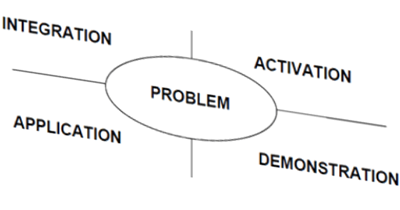First Principles of Instruction
M. David Merrill (2002) identified five Instructional Design principles that promote learning when creating learning/training environments, processes, and products. He noted that the most effective learning processes or environments are problem-centered and involve the learner in the five distinct phases of:
- Learning is promoted when learners are engaged in solving real-world problems — start with simple problems and work through a progression of increasingly complex problems.
- Learning is promoted when existing knowledge is activated as a foundation for new knowledge — prior experience from relevant past experience is used as a foundation for the new skills and knowledge (also know as scaffolding).
- Learning is promoted when new knowledge is demonstrated to the learner — they are shown, rather than just being told.
- Learning is promoted when new knowledge is applied by the learner — they are required to use their new knowledge or skill to solve problems.
- Learning is promoted when new knowledge is integrated into the learner’s world — they are able to demonstrate improvement in their newly acquired skills and to modify it for use in their daily work.
Merrill uses the following diagram to show the four phases surrounding problems:

According to Merrill, the definition of a problem varies among theorists, such as engaging in a simulation or being involved in a real world task. He uses the word problem to include a wide range of activities, with the most critical characteristics being that the activity is a whole task, rather than components of a task and that the task is representative of those the learner will encounter in the real world.
Next Steps
The major instructional design theories and/are models include:
- What is Instructional Design?
- Gagné's Nine Steps of Instruction
- Merrill's First Principles of Instruction
- John Keller's ARCS model
- Merrill's Component Display Theory
- Reigeluth's Elaboration Theory
- Constructivism
- van Merriënboer's 4C/ID Model
- Rapid Instructional Design
Some other models for creating learning processes are:
- Design Methodologies: Instructional, Thinking, Agile, System, or X Problem?
- Instructional Design Framework
- Learning Design Model
- Agile Learning Development
- Learning and Instructional Templates
References
Merrill, M.D. (2002). First principles of instruction. Educational Technology, Research and Development, 50(3), pp43-59.

